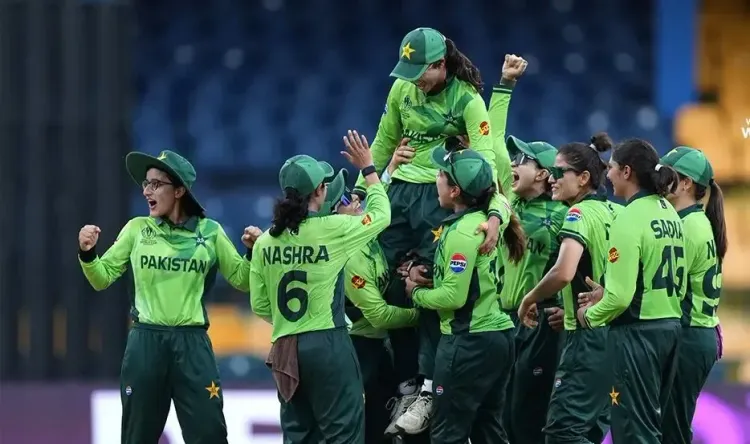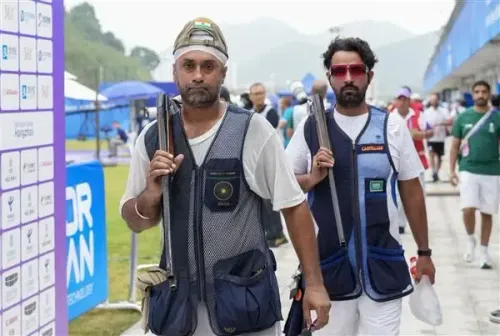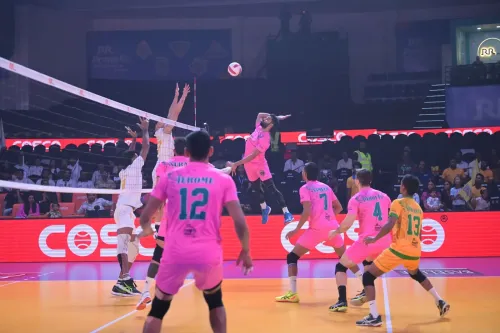Could Pakistan Have Defeated England in the Women's World Cup?

Synopsis
Key Takeaways
- Fatima Sana's leadership shone through with a stellar bowling performance.
- Pakistan's batting needs improvement to convert strong starts into victories.
- Weather impacted the match outcome, leading to shared points.
- England struggled against Pakistan's early bowling attack.
- Future matches are crucial for Pakistan's semifinal hopes.
Colombo, Oct 15 (NationPress) Pakistan's captain Fatima Sana expressed her frustration after relentless rain ruined what she deemed a “golden opportunity” for her team to secure their inaugural victory over England in Women’s ODIs, as their ICC Women’s World Cup match at the R. Premadasa Stadium concluded with no result on Wednesday.
At the time of the interruption, Pakistan was in a strong position with a score of 34 without loss in just 6.4 overs, pursuing a revised target of 113 runs from 31 overs (DLS) when the weather turned again, jeopardizing what appeared to be their best chance to triumph over England on the global stage. Consequently, both teams shared points, a setback for Pakistan’s aspirations for the semifinals, which now hinge on a precarious thread following their third match washout in the tournament.
“This was the day we could have beaten them,” Fatima remarked post-match. “This pitch favored pacers. I observed many performances on this surface, so I was aware it would assist fast bowlers. I aimed to bowl in effective areas and target the stumps. However, I would have been much happier if we had won the match.”
Fatima showcased her leadership with a stellar performance, taking 4 wickets for 27 runs, effectively dismantling England’s top order with a fiery opening spell. Her bowling, supported by Diana Baig (1-25) and Sadia Iqbal (2-16), limited England to 133 runs for 9 wickets in a rain-shortened innings.
After Pakistan opted to field following the toss, Fatima quickly capitalized on the seam movement under the cloudy skies. In her first spell, she took out Amy Jones, Heather Knight, and Nat Sciver-Brunt after Baig had earlier dismissed Tammy Beaumont, reducing England to a mere 39 for 4 within 6.4 overs.
A brief resistance from Emma Lamb and Sophia Dunkley, who added 15 runs for the fifth wicket, was thwarted by Sadia Iqbal’s double-strike, further complicating England’s situation. Heavy rain then caused a three-hour delay, and once play resumed, Charlie Dean (33) and Emily Arlott (21) contributed 46 runs for the eighth wicket to push England past the 130 mark.
Under the DLS method, Pakistan’s chase was adjusted to a target of 113, and openers Muneeba Ali (9 not out) and Omaima Sohail (19 not out) started confidently before rain interrupted play, ending the match prematurely.
Fatima praised her top-order performance: “Muneeba and Omaima showed great composure today. In our last two matches, our bowling was commendable — now we need to enhance our batting. I’m hopeful we will accomplish that.”
Meanwhile, England captain Nat Sciver-Brunt admitted that her side was outperformed in the early phase. “Pakistan bowled exceptionally well. Fatima and Diana made it challenging for us to establish any momentum. The rain break benefitted us, and I felt Charlie and Em batted well in the closing overs to reach that total. Today, we simply weren’t up to the mark.”
She recognized her team’s difficulties against the early movement: “The ball was seaming significantly. We didn’t strategize effectively to counter that threat. Following the Power-play, we kept losing wickets and failed to build partnerships.”
Looking forward, Sciver-Brunt emphasized the need for England to swiftly adjust to new venues and conditions: “Everyone is training diligently; we just need to translate that into our matches. We’re moving to a different ground now — it’s vital to evaluate conditions, devise strategies for setting totals, and choose the appropriate tools for taking wickets.”









